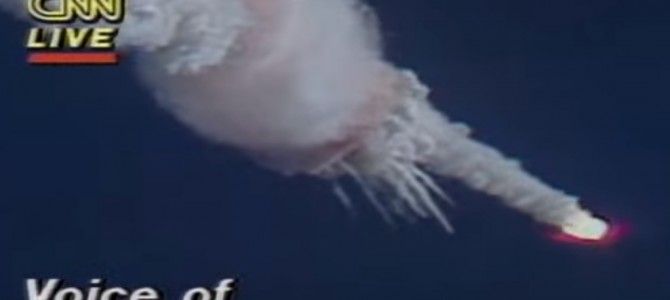
Thirty years ago today, the space shuttle Challenger exploded soon after takeoff, killing all seven crew members. It shocked the nation. The launch and explosion were captured on live television, and because the crew included schoolteacher Christa McAuliffle, who had been selected to be the “first teacher in space,” schoolchildren across the country saw the disaster happen in real time.
President Ronald Reagan was scheduled to deliver the State of the Union address that night but postponed it—the only president ever to do so. Instead, he addressed the nation from the Oval Office.
If that seems like an overreaction, consider that the Challenger explosion marked the first time America had lost an astronaut in flight—and it came 19 years, almost to the day, after the 1967 Apollo I disaster, in which a cabin fire killed all three crew members during a launch rehearsal.
It also came at an uncertain juncture in the Cold War. Months before, Reagan had met with Mikhail Gorbachev for the first time, at the Geneva Summit to discuss international relations and the nuclear arms race. America was actively competing against the Soviets in space, and not always winning. That year, for example, the Soviet Union would launch Mir, the first continuously inhabited space station, which remained in orbit until 2001.
A Speech to a Stricken Nation
Reagan’s Challenger speech is a moving testament not only to his skill as an orator but also to his idea of America. It’s hard to imagine a political leader today, from any party, speaking as he did. Of the astronauts, he said: “They had that special grace, that special spirit that says, ‘Give me a challenge, and I’ll meet it with joy.’ They had a hunger to explore the universe and discover its truths. They wished to serve, and they did. They served all of us.”
Then he pivoted to America’s space program, which had just suffered a terrible setback (and was subsequently put on a 32-month hiatus). He reminded Americans that despite the achievements of the space program over the decades, despite maybe growing used to the idea of space, “We’ve only just begun. We’re still pioneers. They, the members of the Challenger crew, were pioneers.”
To the schoolchildren, many of whom were no doubt frightened by what they’d witnessed that day, Reagan spoke directly. He said that although it’s hard when thing like this happen, “It’s all part of the process of exploration and discovery. It’s all part of taking a chance and expanding man’s horizons. The future doesn’t belong to the fainthearted. It belongs to the brave.”
He then turned to the world and spoke candidly. The Soviet Union’s space program was still classified in 1986, and the outcomes of its missions were only announced after they were confirmed successful, for propaganda purposes. Some failures, in fact, were kept classified almost until the collapse of the Soviet Union in 1991.
Reagan knew this, and knew the Soviets were watching. “We don’t hide our space program,” he said. “We don’t keep secrets and cover things up. We do it all up front and in public. That’s the way freedom is, and we wouldn’t change it for a minute.” He then promised to continue the space program: “Nothing ends here. Our hopes and our journeys continue.”
In Dark Times, Have Faith
Finally, he came back to the fallen astronauts, and made a reference no politician would likely venture today, either out of ignorance or fear of offending. January 28, 1986, happened to be the 390th anniversary of the death of Sir Francis Drake. Reagan seized on that coincidence and likened the Challenger astronauts to Drake, the great explorer of his age: “In his lifetime, the great frontiers were the oceans, and a historian later said, ‘He lived on the sea, died on it, and was buried in it.’ Well today, we can say of the Challenger crew, their dedication, like Drake’s, was complete.”
He closed with this: “The crew of the space shuttle Challenger honored us for the manner in which they lived their lives. We will never forget them, nor the last time we saw them, this morning, as they prepared for their journey and waved goodbye, and slipped the surly bonds of earth to touch the face of God.”
That last line is from “High Flight,” a poem by John Gillespie Magee Jr, a 19-year-old American aviator killed in 1941 on a training mission in England. Magee had volunteered for the Royal Canadian Air Force after the Battle of Britain the year before, and died in a mid-air collision. Reagan’s speechwriter, Peggy Noonan, no doubt had learned the poem in school, as many Americans had. Including it in the speech was a stroke of genius. The poem’s full text reads:
Oh! I have slipped the surly bonds of Earth
And danced the skies on laughter-silvered wings;
Sunward I’ve climbed, and joined the tumbling mirth
of sun-split clouds,—and done a hundred things
You have not dreamed of—wheeled and soared and swung
High in the sunlit silence. Hov’ring there,
I’ve chased the shouting wind along, and flung
My eager craft through footless halls of air….
Up, up the long, delirious, burning blue
I’ve topped the wind-swept heights with easy grace.
Where never lark, or even eagle flew—
And, while with silent, lifting mind I’ve trod
The high untrespassed sanctity of space,
—Put out my hand, and touched the face of God.
In the face of a national tragedy, Reagan appealed to the best in us, to our pioneering spirit and our hope for the future, to our freedoms and our determination to press on, and above all to our courage and our faith. The entire speech lasted less than five minutes.









